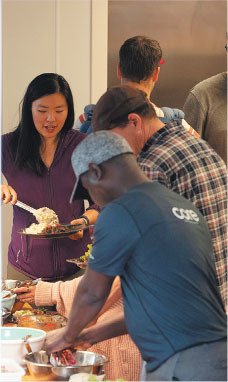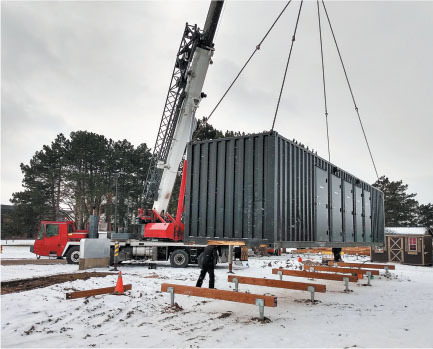Churches and Christian groups are paying attention to the crisis in affordable housing in Canada and bringing ideas – and bricks and mortar – to the table
Although Maya works full-time, finding a place to live in Toronto has been difficult. Initially she lived in a hostel, and then when her finances were too strained, Maya moved into a shelter. When she finally landed a basement apartment, Maya endured harassment from her landlord, who would enter without her consent, open her mail and deny her repair requests.
Now Maya is in an old apartment building that’s "rusty, but safe." Rent is 70 per cent of her income, but she calculates moving would only increase her costs. As a new tenant Maya pays 50 per cent more than her neighbours in similar units.
Maya’s story is not unique, and it’s not just a big city problem. Rural, remote and small Canadian communities are also seeing costs skyrocket. "As an example, Cape Breton," offers Jeff Morrison, executive director of the Canadian Housing and Renewal Association (CHRA) in Ottawa. "Or Prince Edward Island – the mayor of Charlottetown was saying they’re in crisis. And the north is being particularly hard hit."
As a new tenant Maya pays 50 per cent more than her neighbours in similar units.
Across Canada affordable housing is increasingly difficult to find. And Christian groups and churches are increasingly paying attention and trying to help.
Affordable is not what we think
The term affordable housing commonly conjures up images of government-owned or subsidized apartments and townhomes. But it’s actually a broad, technical term. Affordable housing is whenever someone’s cost of housing – whether paid as rent, mortgage, condo fees, co-op dues or utilities and taxes – is less than 30 per cent of a household’s before-tax income. This threshold generally allows people to afford other life necessities, like food, clothing and other living expenses.
The need for affordable housing can impact anyone and even more so in a highly competitive housing and rental market. "It’s no longer just people receiving social assistance or who are unemployed who can’t find homes they can afford. It’s many people working full-time, entry-level jobs – even with a degree," explains Graham Cubitt, president of Flourish, which offers social purpose real estate consulting. Flourish grew out of Indwell, a Christian affordable housing provider in Hamilton, Ont., known for its innovation in creating and managing large affordable housing projects across Southern Ontario.
More than shelter
A lack of housing creates a spiritual as well as a physical need. As people are forced to move in search of affordable accommodations, communities are disrupted. Preston Pouteaux, a pastor who’s passionate about local neighbourhoods, has experienced this kind of loss firsthand in Chestermere, Alta.
"When people in my city feel uncertain about the affordability of their home, or do not see a path towards living in my community long-term, they will not see it as a place worth loving and investing their lives in. As a pastor who cares for my city, this is a vital concern," says Pouteaux.
Theologian and author Brian Walsh agrees a home is a basic spiritual need. Co-author of Beyond Homelessness: Christian Faith in a Culture of Displacement (Eerdmans 2008), Walsh advocates for Christians to be part of the thoughtful creation of housing and homes. Walsh believes for-profit housing developers don’t have enough financial incentive to create affordable housing, and governments are typically unable to develop or maintain housing. "This is a crucial place for the Church, both as institution, but even more importantly as faith community, to take leadership through the development of housing corporations," says Walsh.

Indwell has 17 programs in seven communities across Southern Ontario totalling more than 900 tenants. More than 600 more homes are under construction or in various planning stages; (above) The McQueston Lofts in Hamilton, Ont. PHOTO: INDWELL
Cherie White is someone doing exactly that. Her home and church are in Vancouver’s Eastside, one of Canada’s most troubled neighbourhoods. She’s watched people escape addictions, reconnect with family and even find jobs when given assistance through churches like her own. "But the piece they couldn’t find was housing," says White. Affordable housing is just not available.
The need drove White to leave a job in the Salvation Army to work in real estate. She initially started a social enterprise, helping individuals on a small scale. Now White is looking for investors to help her construct affordable housing on a commercial scale through a social impact real estate development company Steadfast Developments, whose goal is to help revitalize impoverished neighbourhoods. "The Church might think that affordable housing is the government’s responsibility, and not the Church’s responsibility," says White. "And I think that Jesus couldn’t have modelled the opposite more clearly – He moved into the neighbourhood."
In Fredericton, N.B., Marcel LeBrun is founder of 12 Neighbours Community, which is taking a different approach to creating housing. He’s planning to build 96 tiny homes, along with a social enterprise centre to provide a shared workplace and central gathering space for that community.


Co:Here Housing in Vancouver, B.C., prioritizes social connections in their projects. PHOTOS: CO:HERE HOUSING
LeBrun (who is also a board member for the discipleship ministry Navigators of Canada) says he fine-tuned the vision for this community by researching organizations he believed provide development, and not just relief, while also listening and looking for local opportunities to collaborate.
"Really, there are three things that are important," says LeBrun. "Dignity, opportunity and community."
Creating community
Creating community is a common theme among Christian affordable housing providers.
Co:Here Housing in Vancouver provides both community and housing. In their four-storey building – built in a church’s former parking lot – the ground floor is communal. There’s a library and a meeting room, a community kitchen and a dining room, a living room and a guest room.
"Co:Here is both built for social connection and it’s operated for social connection," shares Rebecca Pousette. She’s the project manager for the Co:Here Foundation, which offers development consulting services, particularly for churches. Co:Here grew out of the expertise Grandview Church gained as it struggled for 13 years to create the space. "As a church we realized that relationship needs were just as important as housing needs."
However, creating community may be just as hard, or harder, than building buildings.
People escape addictions, reconnect with family and even find jobs – "But the piece they couldn’t find was housing."
The Downtown Windsor Community Collaborative in Windsor, Ont., is a community of neighbours and friends committed to sharing in the ongoing renewal of downtown Windsor.
Affordable and shared housing grew out of this commitment. But after a few years they realized that actually living together in the same four walls was not sustainable. "There’s a hidden cost," community leader Bob Cameron explains. "The closer we do life together, the greater the probability of conflict."
This New Monastic community continues to care for each other and their neighbours, but not primarily in shared houses.
Overcoming barriers
Challenges can also come from outside the community. Grace Baptist Church in Charlottetown, P.E.I., attempted to build apartments for seniors on their property in 2013. They were surprised by hostility from neighbours.
Churches can expect two typical barriers if they get involved in affordable housing – local bylaws and opposition to change.
"We would come to church on Sundays and there were homemade signs on some people’s lawns – ‘Stop the apartment,’" recalls Jeff Eastwood, elder of preaching and vision.
This kind of resistance to the creation of affordable housing is often called NIMBYism, based on the acronym Not In My Backyard.

A housing project by Co:Here in Vancouver, B.C. PHOTO: CO:HERE HOUSING
Eastwood shakes his head at the paradox. "Everybody talks about the need for affordable housing for seniors, but nobody wants to do anything about it."
Charlottetown’s councillors ended up bowing to public pressure and voting against the project. The church may one day try again. If they do, Eastwood says they will approach things differently. "We could have done a far better job of interacting with our community and understanding that we don’t operate as a silo. We’re part of the subdivision," he says.
Milton Friesen is managing director of CitilQ, an organization that measures the well-being of cities to inform future decisions like housing. He says churches can expect two typical barriers if they get involved in affordable housing – local bylaws and opposition to change.

A bathroom and laundry block getting set up on the site of A Better Tent City in Kitchener, Ont. PHOTO: A BETTER TENT CITY
"It doesn’t matter how good your intentions are, you’ll have to deal with the pragmatics of crossing these hurdles," says Friesen. "Some Christians assume that churches don’t do more because they don’t care. I think a lot care, but they quickly bump into the issue of ‘This might be more than we can manage as a community.’ "
How to partner well
Partnering with other local organizations can be part of the solution. Father Toby Collins of St. Mary’s Roman Catholic Church in Kitchener, Ont., sits on the board for A Better Tent City, a community of small cabins for people experiencing homelessness. A Better Tent City was developed early in the pandemic and has been a collaborative effort from the start.
Collins says it’s both challenging and rewarding to work with those who don’t share the same beliefs. "How we want to help is a little bit different," he says. But this diversity is a strength too. "It expands your understanding of how people can be cared for."
-- Video advertisement from
CCCC --
Justin Marchand, CEO of Ontario Aboriginal Housing Services (OAHS) in Sault Ste. Marie, Ont., and Frances Sanderson, executive director of Nishnawbe Homes Inc. in Toronto, both say they would be eager to partner with churches who have land to offer. "One of our most significant barriers is access to land," says Marchand. "If we can find suitable land, we can make the building happen."
Affordable housing for Indigenous individuals and families is especially needed as they are disproportionately at risk of homelessness. When OAHS opens a new building, they typically have only one space for every ten applicants. Nishnawbe has a ten-year waiting list.
"People are more likely to help a friend than they are to help a stranger," says Sanderson. "So what the Church has to do is they have to make friends within the community, and that only comes from trust and respect."
Alongside community partnerships many housing providers speak of the need to partner with all levels of government. The federal government offers substantial grants any organization can apply for. And many provinces and cities are also willing to help, whether through providing funding, waiving fees or offering other incentives. This is a crisis that has caught the nation’s attention.
Scaling up or down
With the support of government funding, some faith-motivated housing providers have complex and widespread operations, such as Indwell in Hamilton, Ont. Indwell has 17 programs in seven communities across Southern Ontario totalling more than 900 tenants. More than 600 more homes are under construction or in various planning stages.
Big visions are impressive, but creating housing on a small scale can also make a difference. Many Canadians homeowners have more space than they actually need, and with a little imagination, extra rooms can become short-term or long-term accommodations. And Christians are also thinking more creatively about their backyards.
That’s where Southridge Community Church, in Ontario’s Niagara region, is beginning to look. The church hosts an emergency shelter at one of their locations where staff try to connect individuals with permanent housing. But it’s been increasingly difficult to find units that are affordable and safe.
"We need to actually create affordable housing ourselves," says Nate Dirks, action pastor. In St. Catharines the church is looking into building housing units on their property. In Welland they are encouraging and helping interested homeowners build tiny homes in their backyards with the help of a new organization called In My Backyard (IMBY). "It can’t just be the role of government or developers," says Dirks. "It needs to be the role of neighbours."

IMBY helps people share their yards and their lives by building tiny homes (or other additional dwellings) on the properties of willing Canadians. PHOTO: IMBY WEBSITE
That’s what IMBY believes as well. The organization, launched in Hamilton, Ont., in 2020, helps people share their yards – as well as their lives. By building tiny homes (or other types of additional dwelling units) on the properties of willing Canadians, IMBY wants to provide housing and a sense of belonging for both homeowners and tenants. It’s an extremely local solution to the growing national housing crisis.
It’s fine to start small, says Alicia Wilson, one of IMBY’s founders. "If not, I think people just get overwhelmed with the scale of the crisis."
Maya will be the first IMBY tenant when she moves to Hamilton where homeowner Josiah Witt and his household are eager to welcome her into their lives. "When we bought our house, we knew we wanted to find a way to use that to benefit the community in the long term," says Witt. "We know the tremendous benefits of living around people who are looking out for each other and intentionally building healthy relationships."
A local architect is drawing up plans to convert a used 8’ x 40’ shipping container into a tiny home for Maya. This will be her own space for as long as she wants to be there. It’s also the start of an intentional and mutual friendship between Maya and the Witt household.
It can’t just be the role of government or developers. It needs to be the role of neighbours.
Speaker, author and advocate Danielle Strickland is one of IMBY’s founders. She is also a friend of Maya’s who’s excited for the possibilities that come with a long-term home. "It will give her capacity and equity to dream for her future," says Strickland.
For Maya, this feels like the best possible solution to her housing problem. "IMBY is a dream for me, a 3-D colourful dream," she says. "I prayed, dreamt and waited for so long for this. Being part of IMBY is the perfect support package that I need."
Because in the end Maya – like everyone else – is not just looking for a house. She’s looking for a home.

Sarah Robinson is an editor and unofficial party planner for Power to Change–Students. Her hobbies include learning through McMaster Divinity College and wandering the woods near her home in Hamilton, Ont. This past school year she was an intern with IMBY.